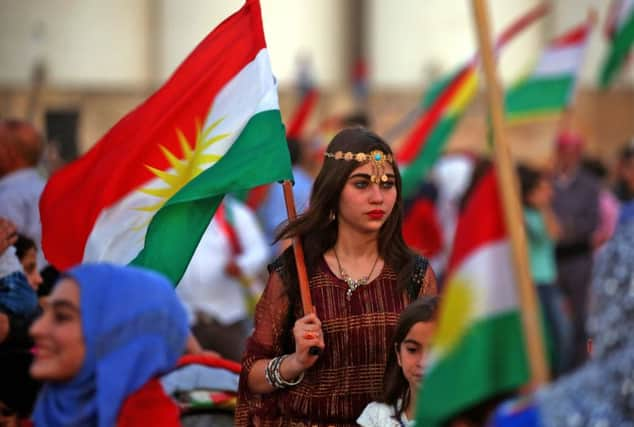Scotland's Kurdish community gripped by independence referendum


The plebiscite in the Kurdish-controlled province - which returned a 93 per cent yes vote - is the latest episode in a centuries-old struggle for self-determination.
An estimated 30 million ethnic Kurds live in a region spanning four countries, but enjoy most political autonomy in Iraq where the Kurdistan Regional Government (KRG) governs the northern portion of the state.
Advertisement
Hide AdAdvertisement
Hide AdAt the 2011 UK census, the Kurdish population in Scotland was recorded as just 844 - but the Glasgow-based Kurdish Knowledge Centre (KKC) told The Scotsman that number had since grown to more than 2,000 due to civil war across Iraq and Syria.
The very staging of the independence vote on September 25 was vigorously opposed by the central Iraqi government as well neighbouring states Turkey and Iran - which both contain sizable Kurdish populations of their own.
The Turkish president, Recep Tayyip Erdogan, threatened to cripple the oil-dependent’s region economy, while Baghdad said it would close its borders and close airports.
But Kurds are used to threats from other powers - an old proverb says they have no friends but the mountains.
A secret number
Arman Zandi, director of the KKC, was born in Iran but claimed political asylum in the UK in 2012. He opened what he desribes as the first non-party affiliated Kurdish research consultancy three years later.
“Since 2014, and the political and economic crisis in the Kurdish part of Syria, the numbers in Scotland have grown,” he said.
“We cannot give an exact figure as, until 2011, ethnicity was not recorded by the Home Office. They were known as Iraqis or Iranians.
“No one knows the real population of the Kurds across the Middle East. My family was never part of any census in Iran. The real number is almost a secret.”
The independence vote
Advertisement
Hide AdAdvertisement
Hide AdTurnout at Monday’s referendum was high - with 72 per cent of the 8.4 million population taking part.
Zandi describes the staging of the vote as “crucial” for Kurds but does not believe it will lead in the short term to the autonomous province splitting from Iraq. Instead, the result will be used as a bargaining chip with Baghdad.
“People do want independence, but for the ruling party, I do not think it is the main goal,” he said. “The Kurds needed to have a card to play with the Iraqi Government. For disputed areas, which they have been fighting for politically, for their fight with Islamic State - for which they have shed much blood - and for their domestic and economic policy.”
He continued: “If the KRG demands maximum devolution - which would allow them to sell their oil independently, for example - then the whole Iraqi constitution must be changed. This represents a very difficult legal problem for both them and Baghdad.
International opposition
In response to the referendum, Iraqi prime minister Haider al-Abadi said that if the KRG wanted to start talks, it first “must cancel the referendum and its outcome.”
On threats from Ankara and Tehran, Zandi believes the reaction from Baghdad to the result will be crucial.
“Does Baghdad want to sacrifice itself? Its claims over Iraqi Kurdistan are economic as well as political.
“I would argue that more important than either Turkey or Iran is Russia. If Russia recognised an independent Kurdistan, I believe that Turkey and Iran would go along with it.”
The Scottish connection
Advertisement
Hide AdAdvertisement
Hide AdThe 2014 referendum on Scottish independence resonated with Kurds said Zandi, with many of those living in Scotland actively campaigning for a Yes vote.
He added: “But the referendums in Scotland and Kurdistan were two very different models, but the majority of Kurds I would say were very much aware of the vote in 2014.”